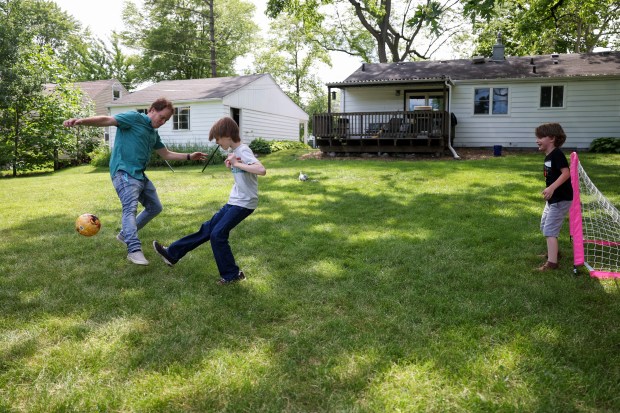Joel Gratcyk remembers the moment he finally broke.
He pulled his car off to the side of the road, tears streaming down his face. His newfound fatherhood was supposed to be one of the happiest times of his life. Instead, he was sinking deep into a heavy sadness while his infant son sat in the back seat.
It was all too much. The stress, the lack of sleep, the lingering fear that he wouldn’t be a good parent.
“I just knew, at that moment, I needed help,” Gratcyk, 42, recalled. “There was too much going on, and I just couldn’t do it myself.”
He’s not alone. An expanding volume of recent research has indicated that fathers, along with their female partners, can develop postpartum depression. Most experts estimate that around 10% of dads will experience the condition, while about 14% of moms will.
Now, a new University of Illinois at Chicago pilot study suggests that men should be routinely screened for PPD. It’s part of a growing push to shift the dialogue surrounding men’s mental health, offering a more robust stream of support for the entire family unit.
“To me, it feels blindingly obvious that we’ve created these gendered care silos, and that has led to the exclusion of dads from this time,” said Sam Wainwright, lead author of the study and an assistant professor of internal medicine and pediatrics at UIC.
Ahead of Father’s Day, Gratcyk reflected on his sons, now 7 and 11. He hopes they’ll feel comfortable sharing their emotions and being vulnerable as they grow older.
“Having those kinds of conversations with my sons, and seeing them be able to be honest and open with me, gives me hope for the conversation to continue to evolve,” Gratcyk said.
Until recent decades, PPD was only associated with women, who undergo more clear physical and hormonal changes during the postnatal period. Treatment for the monthslong depressive episode usually entails counseling or antidepressants. In August, the FDA also approved a first-of-its-kind oral medication to specifically treat PPD.
But men are far from immune to the emotional strain of becoming a new parent. Research has shown dads can even experience sagging testerone levels after the birth of their child, which is associated with mood changes. The onset of paternal PPD typically begins three to six months into the postpartum period.
PPD in dads is also a risk factor for a worsened quality of life and developmental and relational harms in families, according to the study.
“Many times, fathers are feeling overwhelmed by the new experience,” said Sheehan Fisher, a psychologist at Northwestern Memorial Hospital. “They’re trying to figure out how to adjust, but they don’t have a blueprint on how to be a father.”
The study surveyed 24 new dads and found that 30% screened positive for PPD. Wainwright suspects that number is higher than average because 87% of participants identified as belonging to a racial or ethnic minority group, which may leave patients predisposed to mental health issues due to institutionalized economic disparities.
Regular screening of men at baby checkups could forestall the condition, Wainwright said.
“To me, it’s about taking a stand and telling men that, ‘You matter, your health matters,’ and not just because it’s some maternal health goal,” he said.
35 Father’s Day restaurant specials in Chicago and the suburbs, from pig roasts to grilling kits
Previously, Wainwright’s work had centered primarily on women’s health. The UI Two-Generation Clinic, which conducted the study, offers one-stop postpartum care for moms and pediatric checkups. It caters primarily to economically marginalized communities of color.
But clinic staff soon felt that dads were left behind, despite their well-being being vital to families’ overall health. Generally, the only conversations concerning an infant’s father at checkups surround domestic abuse, according to Wainwright.
“The vast majority of men will never do anything but love their partner and their child, even if they’re not married,” he said. “It’s like the posture of our system is assuming that men are a source of violence and not much else.”
The dads who participated in the study ranged from one to 15 months postpartum. Researchers screened the fathers with the Edinburgh Postnatal Depression Scale questionnaire, which is used with mothers.
Social workers also interviewed the dads, many of whom were young, first-time parents who feared that they lacked proper parenting skills. Most experienced significant lack of sleep and noted severe feelings of fatigue. Several said the demand of providing economic support conflicted with the desire to support the increased needs of the mom and the baby.
“They’re really focused on making sure that she’s OK, and therefore they actually tend to neglect their own well-being and their mental health,” Fisher said.
Gratcyk, an Arlington Heights resident, wasn’t aware that PPD could occur in dads until his own symptoms set in. It was beyond the “baby blues” — the anxiety was at times debilitating, and it stretched on for weeks. Still, like many others, he prioritized his wife, who was coping with her own mental health struggles.
“That focus for me was helping (my wife) and the baby as much as I could,” Gratcyk said. “A few months into it, she was doing a lot better having and getting back into the swing of things, and that’s when I started to crack a little.”

Finally, he sought professional health, starting therapy and taking antidepressants. His stress level slowly improved. Only when Gratcyk felt validated was he able to get help, he added.
“At first I did the typical guy thing, where I said, ‘I can figure it out myself, I can take care of myself.’ And that was a mistake,” Gratcyk said.
It’s a common phenomenon. Men are generally less likely to seek help for mental health issues, according to Amanda Atkins, a Chicago therapist certified in perinatal mental health. While she often works with moms with PPD, dads with the condition rarely seek treatment from her office. Stigmas surrounding men’s health may serve as a deterrence, she said.
“I think oftentimes the man feels like there’s no space for him to feel depressed,” Atkins said. “I think that’s where we see men just push it down and be like, ‘I have to be strong.”
PPD is also thought to manifest differently in men, who are more likely to experience irritability and aggression. One study found that depressed dads may be less likely to read to their 1-year-old and more likely to spank them. Experts say the true number of fathers with PPD could be higher than 10% because of the differing symptoms.
“I think if we can just normalize (PPD) more as a society, we will be more in tune to it,” Atkins said.
For Wainwright, the study illustrates a need for a radical shift in health care, where dads are actively included during postpartum checkups. A one-stop system like that of the Two-Generation Clinic could ensure that the entire family unit is receiving sufficient support.
PPD screenings also serve as an opportunity to connect with young men on other aspects of their health, Wainwright said. More than half of participants did not have a primary care physician prior to the study. After, however, two requested mental health services and three established new primary care with a physician.
“Dads are an essential part of kids’ lives, of the life of a family, and they matter for their own sake. And this is a time where you can reach them,” Wainwright said.
Gratcyk experienced another bout of PPD with his secondborn, but it was less severe because he was able to get ahead of his symptoms. His mental health and ability to self-reflect have significantly improved over the past decade, he said.
“I’ve been much better, particularly in the last five to six years,” Gratcyk said. “I’ve been able to properly medicate, go to therapy when needed, and have open and honest conversations about this. It’s helped me process.”



